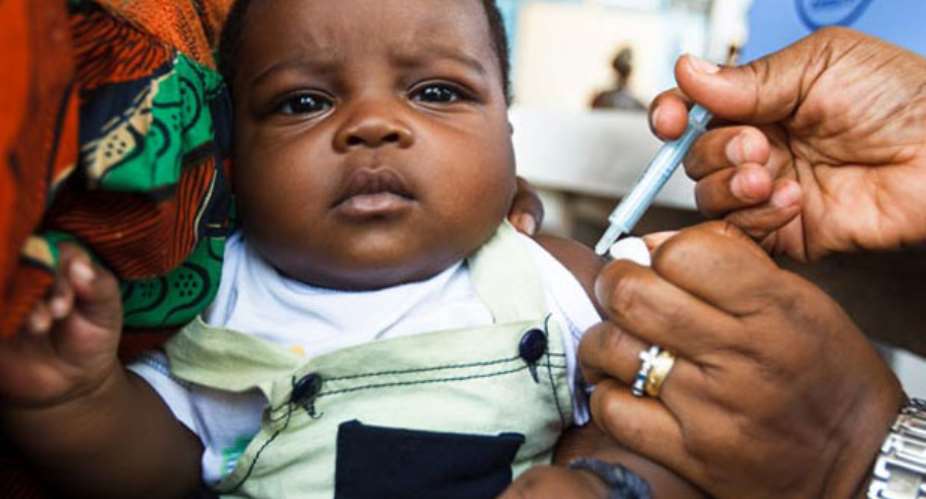Through the Extended Programme on Immunisation (EPI), the Ministry of Health (MoH) will introduce the inactivated polio vaccine (IPV) into the routine immunisation schedule of the country from June 1.
The IPV, given through injection, is expected to be administered together with the oral polio vaccine to children aged 14 weeks and above.
The move is expected to consolidate the gains the country has made so far in its immunisation programme and achieve polio eradication.
The Minister of Health, Kwaku Agyeman-Manu, who announced this at the inauguration of the National Immunization Technical Advisory Group (NITAG) in Accra, said there has been tremendous reduction in morbidity and mortality among children since the country's EPI introduction in 1978.
“It is worthy to note that since 2003, Ghana has not recorded any death due to measles, no case of wild polio virus has been reported since the last outbreak in 2008 and we have eliminated neonatal tetanus since 2011,” he revealed.
He, however, observed that the diseases may reoccur if the country slacks in its immunisation strategies, suggesting a sustained effort in closing the country's immunisation gap.
“Smallpox was the first disease to be eradicated and polio is now being targeted for eradication,” he maintained.
He was optimistic that the constitution of NITAG, which is required to make important technical recommendations that will further contribute to the decline in vaccine preventable disease burden, has been constituted.
In his presentation on the country's immunisation progress, Dr George Bonsu, manager of the EPI, pointed out that Ghana has 93 percent vaccine coverage for 13 vaccine preventable diseases.
He said 50 polio campaigns using the routine OPV have been undertaken so far, with nearly 200 million doses of OPV administered.
Dr Bonsu, however, indicated that an estimated one in 10 infants do not receive the first dose of measles rubella vaccine.
“Measles vaccination although increased over the years plateaued from 2008 to 2017 within an interval of 90.2 and 89.4 percent,” he said.
He, thus, disclosed that with the advent of new vaccines, more technical support is needed to scale up national immunisation coverage.





 Akufo-Addo spotted ordering chiefs to stand for his handshake
Akufo-Addo spotted ordering chiefs to stand for his handshake
 Akufo-Addo ‘disrespects’ every chief in Ghana except Okyenhene — NDC Communicato...
Akufo-Addo ‘disrespects’ every chief in Ghana except Okyenhene — NDC Communicato...
 Supreme Court clears way for dual citizens to hold key public positions
Supreme Court clears way for dual citizens to hold key public positions
 Be transparent, don’t suppress the truth – Prof. Opoku-Agyemang to Jean Mensa
Be transparent, don’t suppress the truth – Prof. Opoku-Agyemang to Jean Mensa
 ‘I won’t tell the world I was only a driver’s mate during challenges’ – Prof Jan...
‘I won’t tell the world I was only a driver’s mate during challenges’ – Prof Jan...
 We’ll prosecute corrupt officials of Akufo-Addo’s govt – Prof Jane Naana
We’ll prosecute corrupt officials of Akufo-Addo’s govt – Prof Jane Naana
 [Full text] Acceptance speech by Prof Jane Naana Opoku-Agyemang as 2024 NDC Runn...
[Full text] Acceptance speech by Prof Jane Naana Opoku-Agyemang as 2024 NDC Runn...
 Election 2024: Don’t be complacent, we haven’t won yet – Asiedu Nketia cautions ...
Election 2024: Don’t be complacent, we haven’t won yet – Asiedu Nketia cautions ...
 Election 2024: Stop fighting over positions in Mahama’s next govt – Asiedu Nketi...
Election 2024: Stop fighting over positions in Mahama’s next govt – Asiedu Nketi...
 Prof Jane Naana Opoku-Agyemang will restore dignity of vice presidency – Fifi Kw...
Prof Jane Naana Opoku-Agyemang will restore dignity of vice presidency – Fifi Kw...
